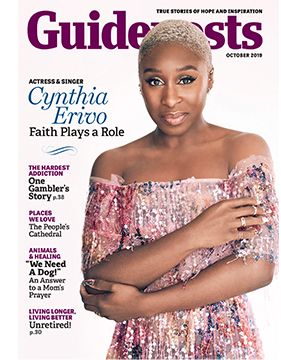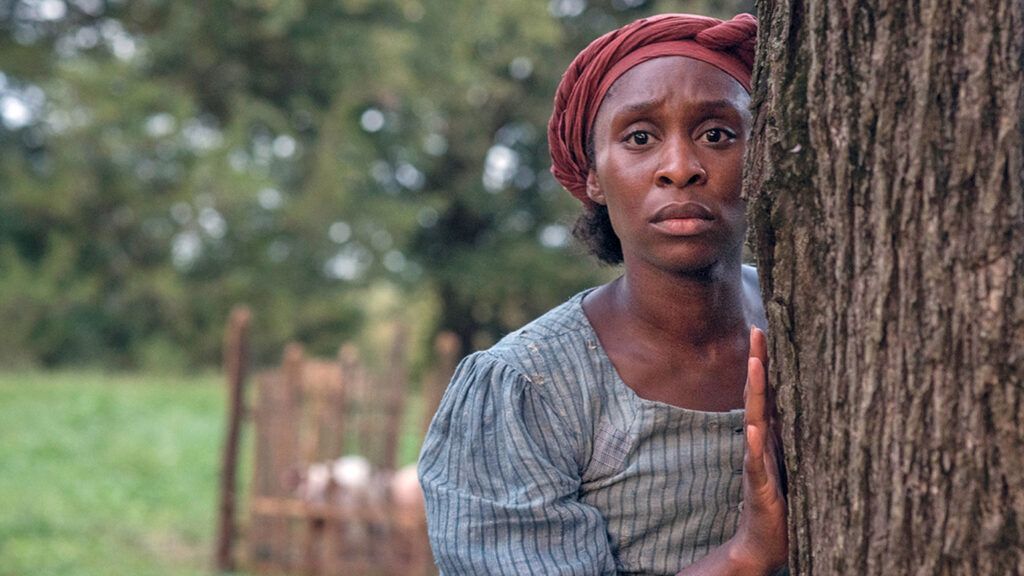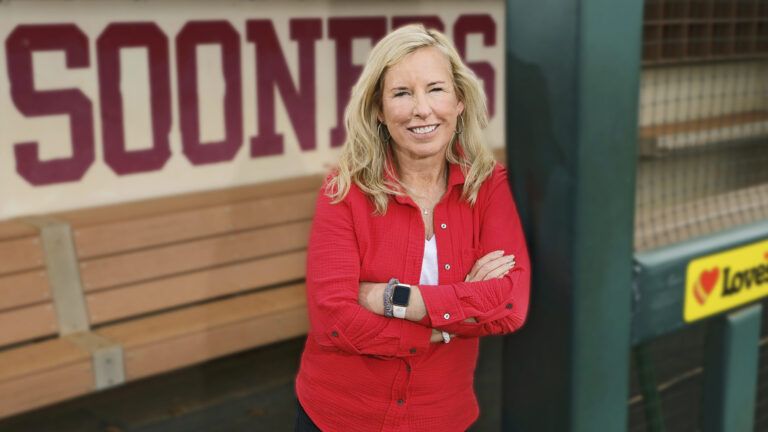I stand on the bridge above the freezing, roaring river. I am out of options, the enemy closing in on me from each direction. The only way out is down. To jump into the swirling rapids below. The way to safety, to freedom. Or to death. I look to the left, look to the right and then do what I always do, ask God for help. Then I jump.
“Cut!”

2019 issue of Guideposts
I play abolitionist Harriet Tubman—a woman of great courage, strength and faith—in the movie Harriet. Taking on the role was a leap in and of itself. A leap of faith.
Most of us know the story. Harriet Tubman made multiple trips into slave-owning territory and brought out some 70 enslaved people on what was called the Underground Railroad, even though by doing so she could have been killed or returned to slavery herself. In the Civil War, she fought with the Union, the first American woman to lead a military expedition. She was celebrated for her valor. All of that can be found in the history books I read as a child growing up in England. (My mother had immigrated there from Nigeria.) What was really at the heart of Harriet Tubman’s bravery?
As an actor, you naturally study the character you’re playing, read all you can about them. One reason I was cast was that I’m short like Harriet Tubman, a little over five feet. I’m also a fairly physical actor. She was strong, powerful. To play this part, I knew I would have to work out even harder than usual to be able to do what she did. Lots of trips to the gym.
To really master a role, every actor tries to find a way into the character she’s playing. To play Harriet, I had to understand faith at its most elemental level. To understand her faith and courage, I needed to probe my own faith and call on it. Harriet never did anything without listening to God for guidance, being present to the dangers she faced and present to what could take her through them. “I prayed to God to make me strong and able to fight,” she once said. “And that’s what I’ve always prayed for ever since.”
My faith is always with me. It was my mother who taught me how to pray. We prayed over dinner, and she heard my bedtime prayers. I also heard her pray in the shower and in the bathroom when she was getting dressed before work. She prayed out loud, talking to God as though he was right there in the room with her. There were no restrictions when it came to prayer. You could pray at any time and all times. God was with you.
I realized that’s exactly how Harriet survived, being in touch with God constantly. She could jump into that cold water because she prayed, “River of peace, flow through me. Lord, help me, help me through.” She could rescue others without heeding her own safety and freedom because she believed God was always with her and for her. I would have to feel the same. To shoot scene after scene in frigid temperatures, I needed to be Harriet Tubman. Before I even left my house and got to the set, I prayed, “Keep us safe, keep our bodies safe, keep our minds alive and make the place safe for her to be in. Bring Harriet into this place.” I asked God to give me the strength to get through the day and tell the story as truthfully as I could and to know that Harriet herself was watching over us.
The obstacles to the film were huge, but then the obstacles Harriet faced in her life were far greater. She suffered terribly. As an adolescent, she came between a violent slave owner and another slave. The owner hurled a heavy metal weight at the slave, but it hit Harriet in the head instead, injuring her permanently. For the rest of her life, she suffered dizziness, pain and seizures. During seizures that rattled her body, she would have visions, visions of God communicating to her.
I had to be strong like her, but I also had to feel—from the inside—what it would be like to be a slave. To be subjugated and abused. To have seizures and visions. Reenacting one, I felt wretched, raw, emotionally undone. Super-exposed. Which I imagine is how Harriet felt. It must have been unbelievably hard. But sometimes going through an illness can open you up to things you wouldn’t be able to do otherwise. In suffering, we also find a new closeness to God.
There were two songs Harriet often used, according to historians, when she was sneaking into dangerous territory via the Underground Railroad. A fellow abolitionist had nicknamed her Moses, and naturally enough she would sing “Go Down, Moses” and “Bound for the Promised Land,” bringing liberated slaves to a new promised land. Those spirituals became passwords, and she would change the cadence to let others know if it was safe to come out in the middle of the night.
Though she couldn’t read or write, Harriet was savvy and wise. If she noticed someone trying to identify her on a train, she picked up a newspaper and pretended to read it. In a scene from the movie, a slave owner waves a wanted poster in her face. Isn’t she this Moses? Shouldn’t she be arrested and put in jail? No, no, she coyly suggests. It couldn’t be her. She’s not at all the right height.
She had been born Araminta Ross and called Minty, but when she found her way to freedom she chose a new name. In the movie, we show that historic moment when, at the Pennsylvania Society for the Abolition of Slavery, she tells William Still—portrayed by actor Leslie Odom, Jr.—that she is Harriet Tubman, Tubman for her husband, who was still in Maryland, Harriet in honor of her mom.
Prayer was always with us on the shoot. We filmed in cold weather because Harriet often traveled in the wintertime. It was safer. People were more likely to be indoors, and she was less likely to be noticed. Facing the elements, I would prepare by singing to myself, listening to gospel music—Kim Burrell and Mali Music—the way Harriet would sing to herself to stay connected to her faith.
I also prayed with the other actors right on the set. In one scene, Harriet meets with Reverend Green—the actor Vondie Curtis-Hall—and he prays for her, for her upcoming journey. We were in the church, I was sitting opposite Vondie, and we were two actors doing a scene. Yet the prayer was real and unrehearsed. It had to be.
There was a day on the set when everything seemed to be going wrong. We were rushing around, and I didn’t feel I truly had time to prepare for a scene we were about to do, that pivotal moment when Harriet walks across the Delaware border to freedom. Kasi Lemmons, our wonderful director, wanted to catch the sunrise, but the weather wasn’t cooperating. It was cloudy and overcast. Rain started to fall. We’d never get the shot she wanted. Time was running out.
Still, the cameras were rolling. We’d have to settle for less. We’d do what we could. What would Harriet Tubman have done? She would have called on God. She always called on God. She couldn’t have done the heroic things she had done without that. As Harriet—as myself—as both of us, I said a prayer of my own. I stepped across the border. All at once the clouds parted, and this big bright yellow-orange sun came forth, shining in my eyes. There was even a rainbow. Then another one, a double rainbow. It was overwhelming. God speaking, Harriet speaking, in unison. I looked around me, and everyone was in tears, the camera crew, Kasi, everyone. What you see in the movie is what really happened, no CGI.
It was such an honor to portray her, but I couldn’t have done it without my faith. Being Harriet meant being in God’s continual presence. There were times I couldn’t even separate myself from her. To know this woman who refused to let circumstances dictate her future, refused to cave to fear, who stood up to the evil of slavery. Guided by her faith, she changed the course of history. Playing this role changed my life too.
For more inspiring stories, subscribe to Guideposts magazine.






